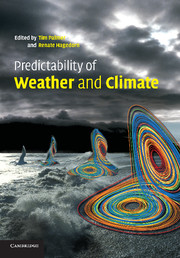Book contents
- Frontmatter
- Contents
- List of contributors
- Preface
- Chapter 1 Predictability of weather and climate: from theory to practice
- Chapter 2 Predictability from a dynamical meteorological perspective
- Chapter 3 Predictability – a problem partly solved
- Chapter 4 The Liouville equation and atmospheric predictability
- Chapter 5 Application of generalised stability theory to deterministic and statistical prediction
- Chapter 6 Ensemble-based atmospheric data assimilation
- Chapter 7 Ensemble forecasting and data assimilation: two problems with the same solution?
- Chapter 8 Approximating optimal state estimation
- Chapter 9 Predictability past, predictability present
- Chapter 10 Predictability of coupled processes
- Chapter 11 Predictability of tropical intraseasonal variability
- Chapter 12 Predictability of seasonal climate variations: a pedagogical review
- Chapter 13 Predictability of the North Atlantic thermohaline circulation
- Chapter 14 On the predictability of flow-regime properties on interannual to interdecadal timescales
- Chapter 15 Model error in weather and climate forecasting
- Chapter 16 Observations, assimilation and the improvement of global weather prediction – some results from operational forecasting and ERA-40
- Chapter 17 The ECMWF Ensemble Prediction System
- Chapter 18 Limited-area ensemble forecasting: the COSMO-LEPS system
- Chapter 19 Operational seasonal prediction
- Chapter 20 Weather and seasonal climate forecasts using the superensemble approach
- Chapter 21 Predictability and targeted observations
- Chapter 22 The attributes of forecast systems: a general framework for the evaluation and calibration of weather forecasts
- Chapter 23 Predictability from a forecast provider's perspective
- Chapter 24 Ensemble forecasts: can they provide useful early warnings?
- Chapter 25 Predictability and economic value
- Chapter 26 A three-tier overlapping prediction scheme: tools for strategic and tactical decisions in the developing world
- Chapter 27 DEMETER and the application of seasonal forecasts
- Index
- Plate section
- References
Chapter 16 - Observations, assimilation and the improvement of global weather prediction – some results from operational forecasting and ERA-40
Published online by Cambridge University Press: 03 December 2009
- Frontmatter
- Contents
- List of contributors
- Preface
- Chapter 1 Predictability of weather and climate: from theory to practice
- Chapter 2 Predictability from a dynamical meteorological perspective
- Chapter 3 Predictability – a problem partly solved
- Chapter 4 The Liouville equation and atmospheric predictability
- Chapter 5 Application of generalised stability theory to deterministic and statistical prediction
- Chapter 6 Ensemble-based atmospheric data assimilation
- Chapter 7 Ensemble forecasting and data assimilation: two problems with the same solution?
- Chapter 8 Approximating optimal state estimation
- Chapter 9 Predictability past, predictability present
- Chapter 10 Predictability of coupled processes
- Chapter 11 Predictability of tropical intraseasonal variability
- Chapter 12 Predictability of seasonal climate variations: a pedagogical review
- Chapter 13 Predictability of the North Atlantic thermohaline circulation
- Chapter 14 On the predictability of flow-regime properties on interannual to interdecadal timescales
- Chapter 15 Model error in weather and climate forecasting
- Chapter 16 Observations, assimilation and the improvement of global weather prediction – some results from operational forecasting and ERA-40
- Chapter 17 The ECMWF Ensemble Prediction System
- Chapter 18 Limited-area ensemble forecasting: the COSMO-LEPS system
- Chapter 19 Operational seasonal prediction
- Chapter 20 Weather and seasonal climate forecasts using the superensemble approach
- Chapter 21 Predictability and targeted observations
- Chapter 22 The attributes of forecast systems: a general framework for the evaluation and calibration of weather forecasts
- Chapter 23 Predictability from a forecast provider's perspective
- Chapter 24 Ensemble forecasts: can they provide useful early warnings?
- Chapter 25 Predictability and economic value
- Chapter 26 A three-tier overlapping prediction scheme: tools for strategic and tactical decisions in the developing world
- Chapter 27 DEMETER and the application of seasonal forecasts
- Index
- Plate section
- References
Summary
Basic aspects of the atmospheric observing system and atmospheric data assimilation are summarised. Characteristics of the assimilation of observational data from the late 1950s onwards in the ERA-40 reanalysis project, and of medium-range forecasts run from the ERA-40 analyses, are used to illustrate improvement in the observing system and to place in context the improvement of the operational forecasts of the European Centre for Medium-Range Weather Forecasts (ECMWF) over the past 25 years. Recent advances in operational forecasting are discussed further. It is shown that the analyses of two centres, ECMWF and the Met Office, have converged substantially, but that there remain nevertheless significant differences between these analyses, and between the forecasts made from them. These differences are used to illustrate several aspects of data assimilation and predictability. Inferences from differences between successive daily forecasts and from spectra of forecast errors are also discussed for the ECMWF system.
Introduction
This chapter is based on the introductory lecture given to the Annual ECMWF Seminar for 2003, which was devoted to data assimilation. The subject had last been addressed in the Seminar Series in 1996. In the opening lecture on that occasion, the late Roger Daley discussed how, over the preceding 15 years, data assimilation had evolved from being a minor and often neglected subdiscipline of numerical weather prediction to become not only a key component of operational weather forecasting but also an approach that was important for environmental monitoring and estimation of the ocean state.
Information
- Type
- Chapter
- Information
- Predictability of Weather and Climate , pp. 428 - 458Publisher: Cambridge University PressPrint publication year: 2006
References
Accessibility standard: Unknown
- 6
- Cited by
